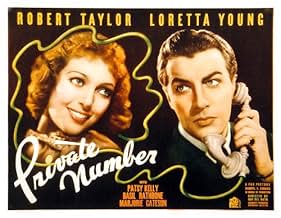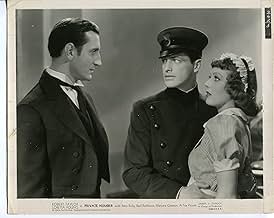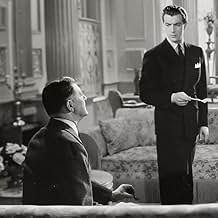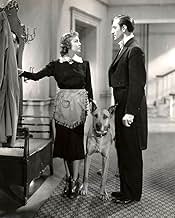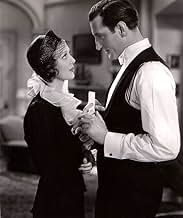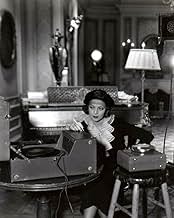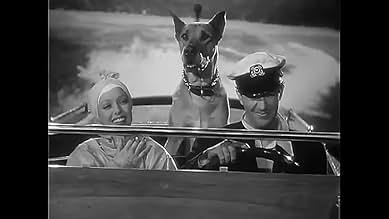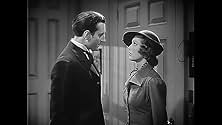NOTE IMDb
6,7/10
625
MA NOTE
Ajouter une intrigue dans votre langueA maid secretly marries the son of her wealthy boss.A maid secretly marries the son of her wealthy boss.A maid secretly marries the son of her wealthy boss.
- Réalisation
- Scénario
- Casting principal
Joe E. Lewis
- Smiley Watson
- (as Joe Lewis)
Alexander Pollard
- Footman
- (as Alex Pollard)
Avis à la une
Ellen (Loretta Young) arrives at a mansion seeking work as a domestic. Although she has no previous experience and normally wouldn't have been hired, the cruel head butler (Basil Rathbone) thinks she's a hot tomato and hires her--presumably so he can one day have his way with her. However, the unexpected happens...the son of the family she now works for soon falls for her. Richard (Robert Taylor) is very persistent and eventually they begin seeing each other on the sly. It becomes serious...so serious that he wants to marry her. But if she does, will the family accept her? And what about the cruel head butler? He's not the sort to just give up...especially when he has something he can blackmail her with should he choose to do so.
This is a very interesting film when you realize how tall Basil Rathbone was in real life. He wasn't a small guy...but here the director must be manipulating perspective to make him look much taller and more menacing. So, while he's only less than two inches taller than Robert Taylor, he towers over him...and everyone else. This was actually a smart move and really made him seem all the more awful!
So is this any good? Well, considering the actors, it couldn't help but be very good. Young and Taylor are very good but Rathbone steals the show with his shear awfulness...he really was a terrific villain. Also, in a small role, Monroe Owsley was AMAZING as a pusilanimous jerk...and his courtroom scene is one of the best I've seen in some time. Too bad Owsley died the following year. Well worth seeing and satisfying all around.
This is a very interesting film when you realize how tall Basil Rathbone was in real life. He wasn't a small guy...but here the director must be manipulating perspective to make him look much taller and more menacing. So, while he's only less than two inches taller than Robert Taylor, he towers over him...and everyone else. This was actually a smart move and really made him seem all the more awful!
So is this any good? Well, considering the actors, it couldn't help but be very good. Young and Taylor are very good but Rathbone steals the show with his shear awfulness...he really was a terrific villain. Also, in a small role, Monroe Owsley was AMAZING as a pusilanimous jerk...and his courtroom scene is one of the best I've seen in some time. Too bad Owsley died the following year. Well worth seeing and satisfying all around.
Private Number starts off strong and interesting and remains so until the near ending. It's one of those stories where all kinds of hubris, angst, and courtroom drama unfold simply because the two leads refuse to have a simple 10 minute conversation that could easily and readily clear things up. Yes, I know that is a device to create drama and tension but here it only served to annoy me. Especially when having that very brief conversation could improve your life so completely. Anyway, Young and Taylor are very good as the young lovers and Rathbone is excellent as the bad guy. Despite my issues with the near ending of Private Number it's still fairly entertaining and one worth checking out.
This movie has its charms, but it cannot be a "Pre-Code gem," since it came out two years after the Code clampdown kicked in.
It's a little sappy, actually -- it'd have been much better if it HAD been made during the Pre-Code era.
But I do agree that Loretta Young's delightful in it.
It's a little sappy, actually -- it'd have been much better if it HAD been made during the Pre-Code era.
But I do agree that Loretta Young's delightful in it.
"Private Number" is a most enjoyable film that may be largely unknown among most buffs of older films today. But it has a very pleasing cast , good dialog, beautiful sets and costuming, a dastardly Basil Rathbone, the beautiful voice of a young Robert Taylor, and the gloriously glistening eyes of Miss Loretta Young. How did they do that with her eyes? She was such a fine and watchable actress, her performance here nuanced and anticipatory in her give and take with the troupe, even though the production was likely on a conveyor-belt schedule.
It isn't one of the all-time great films, but it is a very good and worthwhile one. The film's subject matter may have even made a lot of those in the 1936 movie audiences a bit uncomfortable.
"Private Number" is a nice little romantic picture about love between the haves and have nots. Representing the latter is lovely Loretta Young, a penniless young woman who decides to apply for a job as a maid and on the other side is handsome Robert Taylor, who happens to be the son of the wealthy couple who employ her. Back home from college for the summer, Taylor presumes Loretta is one of the guests for the party welcoming him home but even after discovering her actual status is bewitched enough by her beauty to still pursue her. Looking on with malice is head butler Basil Rathbone who wants Loretta for himself (his creepy demeanor and malevolent running of the house staff cancels any possibility Loretta would want him). Taylor persuades Young to secretly marry him, planning to announce their marriage after graduation. Trouble is Loretta with child while he is away at school, leading a jealous Rathbone scheme to destroy her relations with the family.
Robert Taylor was only a year into his stardom when this film was made in 1936 and he is once again in the type of role he specialized in at the time, the dashing young heir pursuing a young woman in a Cinderella romance but one that has turns with misunderstandings and mistrust. It's almost the same story as "Small Town Girl", a better picture he also made that year. On loanout here to 20th Century-Fox, the MGM hunk was the undisputed heartthrob of the moment and among the top five box office stars (he would have been unrivalled in the late 1930's had Fox not quickly developed their own matinee idol in Tyrone Power later that year.) Taylor's very good but since Loretta Young was a Fox contractee, her character dominates the story. Gentle and graceful, Loretta was a moderately talented actress very capable in light stories like this one.
The supporting cast is hit and miss. Earthy chatterbox Patsy Kelly steals the film as Loretta's best friend, one of the family's other maids, and the excellent, elegant character actress Marjorie Gateson is quite good as Taylor's mother, taking a shine to Loretta early on and making her a personal maid. Basil Rathbone, alas, was always unsubtle when playing a villain and here he's such a creep it's hard to believe the family would ever believe he was looking out for their best interests. Paul Harvey was also a little excessive as Taylor's father. On the other hand, the underrated Monroe Owsley, is a bit of a surprise. Always cast as untrustworthy dalliances for movie queens (Stanwyck, Mae West, etc.) here he comes across a believable nice guy. We (and Loretta!) should have known better! Kane Richmond, a Robert Taylor type for B movies in that era, has a brief role as the family's chauffeur.
The film audaciously has many parallels with Loretta Young's private life, one wonders if the studio had concocted this little story to put some confusion in the public re speculation about her private romances, as if the public hearing the Hollywood whispers might conclude it was all just a movie plot. Unwed Loretta had just given birth to Clark Gable's child which much of Hollywood suspected but it was never acknowledged until the 1990's when Loretta was near the end of her life. In this movie, Loretta has to fight an annulment so that her baby will remain "legitimate". If that's not nervy enough, how about a scene where Patsy Kelly rhapsodizes about Clark Gable's screen sex appeal to which Loretta whole-heartedly agrees!
"Private Number" is basically just a pleasant but unremarkable romantic drama, the screen equivalent to a paperback romance novel but with beautiful stars and a smooth production to hold your interest.
Robert Taylor was only a year into his stardom when this film was made in 1936 and he is once again in the type of role he specialized in at the time, the dashing young heir pursuing a young woman in a Cinderella romance but one that has turns with misunderstandings and mistrust. It's almost the same story as "Small Town Girl", a better picture he also made that year. On loanout here to 20th Century-Fox, the MGM hunk was the undisputed heartthrob of the moment and among the top five box office stars (he would have been unrivalled in the late 1930's had Fox not quickly developed their own matinee idol in Tyrone Power later that year.) Taylor's very good but since Loretta Young was a Fox contractee, her character dominates the story. Gentle and graceful, Loretta was a moderately talented actress very capable in light stories like this one.
The supporting cast is hit and miss. Earthy chatterbox Patsy Kelly steals the film as Loretta's best friend, one of the family's other maids, and the excellent, elegant character actress Marjorie Gateson is quite good as Taylor's mother, taking a shine to Loretta early on and making her a personal maid. Basil Rathbone, alas, was always unsubtle when playing a villain and here he's such a creep it's hard to believe the family would ever believe he was looking out for their best interests. Paul Harvey was also a little excessive as Taylor's father. On the other hand, the underrated Monroe Owsley, is a bit of a surprise. Always cast as untrustworthy dalliances for movie queens (Stanwyck, Mae West, etc.) here he comes across a believable nice guy. We (and Loretta!) should have known better! Kane Richmond, a Robert Taylor type for B movies in that era, has a brief role as the family's chauffeur.
The film audaciously has many parallels with Loretta Young's private life, one wonders if the studio had concocted this little story to put some confusion in the public re speculation about her private romances, as if the public hearing the Hollywood whispers might conclude it was all just a movie plot. Unwed Loretta had just given birth to Clark Gable's child which much of Hollywood suspected but it was never acknowledged until the 1990's when Loretta was near the end of her life. In this movie, Loretta has to fight an annulment so that her baby will remain "legitimate". If that's not nervy enough, how about a scene where Patsy Kelly rhapsodizes about Clark Gable's screen sex appeal to which Loretta whole-heartedly agrees!
"Private Number" is basically just a pleasant but unremarkable romantic drama, the screen equivalent to a paperback romance novel but with beautiful stars and a smooth production to hold your interest.
Le saviez-vous
- AnecdotesEarly in the picture, Ellen, portrayed by Loretta Young, is discussing a blind date with Gracie, portrayed by Patsy Kelly. Ellen says she hopes the guy can dance. Gracie replies that the last one was a corporal that "was as handsome as Gable, and Gable ain't bad!" Ellen replies, "Oh I'll say not!" This discussion is ironic because when filming L'appel de la forêt (1935) the year before this film was released, Young had an affair with Clark Gable, leading to the birth of their daughter, Judy Lewis. Audiences at the time didn't realize the irony since this secret affair wasn't made public until years later.
- GaffesJane Darwell is billed as "Mrs. Meecham" but is called "Mrs. Frisby" twice.
- Citations
Ellen Neal: I'm talking about love Dick. You're talking about marriage. I couldn't marry you because... it would just be a mistake. That's all.
- ConnexionsAlternate-language version of Terre commune (1930)
Meilleurs choix
Connectez-vous pour évaluer et suivre la liste de favoris afin de recevoir des recommandations personnalisées
- How long is Private Number?Alimenté par Alexa
Détails
- Durée1 heure 20 minutes
- Couleur
- Rapport de forme
- 1.37 : 1
Contribuer à cette page
Suggérer une modification ou ajouter du contenu manquant

Lacune principale
By what name was Une certaine jeune fille (1936) officially released in India in English?
Répondre
